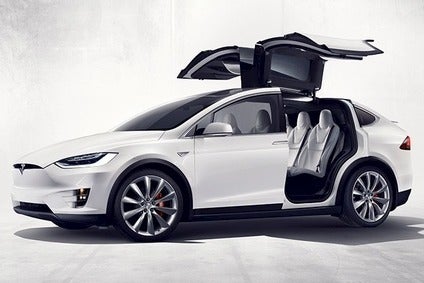This presentation by Elon Musk is half an hour long but well worth watching. It demonstrates yet again that Tesla Motors doesn't do many things in the same way as other car companies.
To this observer, the new Model X looks ungainly in some colours and from certain angles, but then in other shades its lines and stance are sublime. There are lots of clever touches, such as sunvisors which rest on the A pillars and pivot to then lock magnetically to the rear-view mirror (the front section of the roof is glass) and sensors to stop the so-called Falcon Wing doors hitting the ceiling and walls of your garage. Tesla has even eliminated the ugly parking sensor pucks which we're so used to seeing on cars' undersides and bumpers – the doors' radar can see through metal, as Elon Musk puts it.
The performance figures are sensational – 0-60mph in as little as 3.2 seconds, and even the slowest variant takes a claimed 4.8 seconds – but Tesla's new focus on safety is fascinating. And 'air safety' is a term we might hear more of. If you're still watching at the 11 minutes and 48 seconds mark you'll see something I for one hadn't heard anyone in a car company talking about: Bioweapon Defense Mode. A Model X is the place to be when there's a chemical weapon attack, apparently.
It's an impressive new car and we should applaud Elon Musk's vision. Yet, am I alone in wondering if battery tech is still the big problem with EVs? Right at the end of Tesla's media release on the Model X is the car's weight. This is quoted as being 5,441 lbs, which is a super-lardy 2,468kg. About the same as a Land Rover Discovery – a very old-tech seven-seat SUV. Add luggage. Include an adult occupant in each of the seven seats. You're looking at well over three tonnes. Does that matter? Of course it does. What will be the impact on the car's claimed range of 250 miles? What will its crash performance be like? How good will its braking ability be, and with a caravan or boat attached surely we're then talking around four tonnes?
The Model X has the potential to be a strong seller and to change the way people view SUVs. Yet one of the things it really draws attention to is how we are still waiting to see mass production applications of the ongoing advances in battery chemistry. These are needed to tackle the big issue: weight.
Not wishing to underplay the hard work already done by the scientists at Panasonic, the supplier of the cylindrical cell packs for the Model S and the new Model X, but it does seem as though there is a lot more work to be done before any of us can really be thinking of Tesla's EVs as the most advanced cars on the market.







